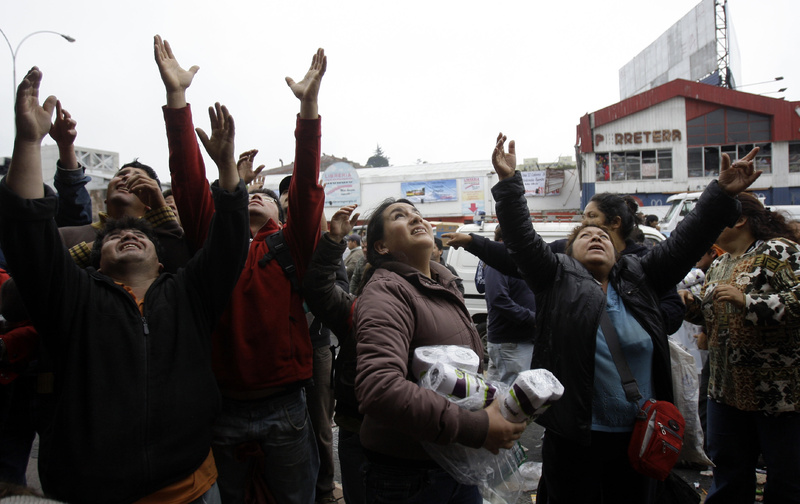CONSTITUCION, Chile – Looting spread Monday in earthquake-leveled parts of Chile even as army troops deployed in armored vehicles and on horseback to restore order and protect shipments of food and water. Scores of people were arrested for violating an overnight curfew.
With the death toll creeping higher, Chile continued to reel from Saturday’s magnitude-8.8 quake, one of the strongest on record. At least 723 people were killed, the government said, and many remained missing.
Numerous oceanfront towns, like Lloca, Dichato and Constitucion, were devastated first by the quake and then, minutes later, by tsunamis. Little or no help had reached these sites by Monday, residents said.
“We need food! We need water!” said a beleaguered Cesar Arrellano, a municipal comptroller in Constitucion who received unrelenting reports of damage, death and the desperate need for help.
Chile’s second-largest city, Concepcion, seemed to be suffering the brunt of post-disaster chaos. Looters raided a firehouse in search of water and gasoline; others later torched a shopping center.
Concepcion Mayor Jacqueline Van Rysselberghe said looters were moving in organized packs and attacking firefighters and city workers attempting to distribute water.
“Our firefighters, our personnel, don’t want to keep doing this work in these circumstances,” she said. “If a bigger contingent (of soldiers) isn’t sent here quickly, the people will begin to take the law into their own hands.”
Fire raged in a downtown Concepcion shopping mall. A radio reporter said she saw people in a vehicle toss a Molotov cocktail into the collection of stores just before the fire erupted. Firefighters could do nothing because they had no water. The building, looted earlier in the day, was collapsing under the flames.
President Michelle Bachelet imposed emergency decrees, including putting the army in charge of hard-hit areas.
The government promised to distribute food, water and other essential supplies Monday in Concepcion and other communities. But aid seemed to trickle in, slowed by mangled roads, collapsed bridges and the lack of electricity. A small plane bringing aid to Concepcion crashed Monday, killing all six people on board.
Bachelet called on power companies to restore energy to hospitals and clinics and urged local authorities to quickly identify and bury bodies. In Constitucion, caskets were stacked in the town gym, which had been converted into a morgue.
Bachelet declared a 30-day state of emergency for the coastal states of Bio Bio and Maule, sent in the army and slapped an overnight curfew on major cities in the region. It was the first time a government has taken action to suspend some civil rights since democracy was restored to Chile 20 years ago. Using the army for public security is still a sensitive subject in Chile, a country that endured nearly two decades of military dictatorship before the 1990 ouster of Gen. Augusto Pinochet’s regime.
The possibility of a “social explosion” quickly emerged as the government’s “worst fear,” the leading Chilean newspaper El Mercurio reported, noting that the emergency decree was agreed to only after intense debate because of its potential symbolism.
In Concepcion, rescue efforts centered on a 15-story apartment building that collapsed onto its side. Rescue workers equipped with search dogs and architectural blueprints sliced through concrete and punched triangular holes into the side of the building in hopes of finding survivors.
In Santiago, the capital, life crept slowly back to normal Monday, with many people driving to work but also with long lines at supermarkets and gasoline stations. The start of school after the southern hemisphere’s summer vacation was postponed until next week.
Slow to ask for help, Bachelet has said she would welcome international aid. The United Nations said Monday it would rush deliveries, and Argentina announced it was sending a field hospital and water treatment plants.
In Washington, U.S. officials said Monday that Chile has made modest requests of the United States so far, leaving it unclear whether the administration would mount a major effort to help, as it has for Haiti.
Philip J. Crowley, the State Department’s chief spokesman, said the United States has so far been asked to contribute a field hospital, communications equipment and water filtration equipment. U.S. Secretary of State Hillary Rodham Clinton, who will arrive in Santiago today as part of a five-nation Latin America tour, will bring satellite equipment.
Send questions/comments to the editors.



Success. Please wait for the page to reload. If the page does not reload within 5 seconds, please refresh the page.
Enter your email and password to access comments.
Hi, to comment on stories you must . This profile is in addition to your subscription and website login.
Already have a commenting profile? .
Invalid username/password.
Please check your email to confirm and complete your registration.
Only subscribers are eligible to post comments. Please subscribe or login first for digital access. Here’s why.
Use the form below to reset your password. When you've submitted your account email, we will send an email with a reset code.